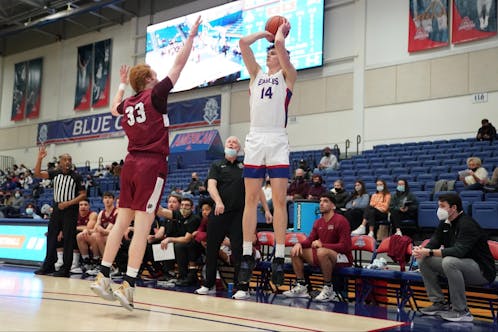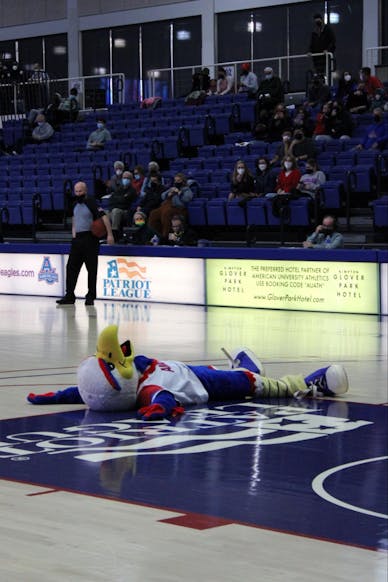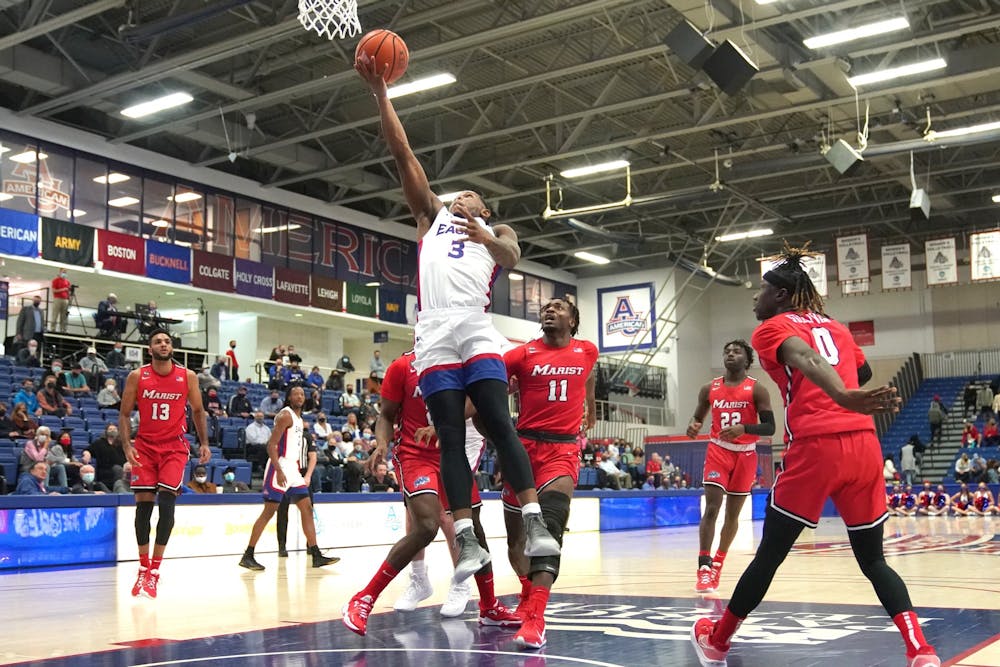The American University men’s basketball team was outscored 2270 to 2031 by their opponents during the 2021-2022 season, according to an Eagle analysis of the season. The deficit was reflective of their record this season.
The Eagles finished the 2021-2022 season 10-22, eliminated from the Patriot League tournament after a loss to Navy in the quarterfinals.
Despite being ranked 335 out of 358 NCAA men’s basketball teams in Sports Illustrated’s preseason ranking of all Division I schools, the Eagles’ season started out strong.
AU out-witted Marist in overtime in an instant classic and thoroughly outmatched William & Mary on the road, revenge for their victory at Bender Arena in 2019.
Then things began to fall apart. AU went on a seven-game road losing streak, the Eagles had multiple games canceled or rescheduled due to COVID-19, lost several key players to injury and the Eagles never recovered.
While AU bested Holy Cross in the PL first round, their first victory in the tournament since the 2015-2016 season, the Eagles had trouble against the rest of the Patriot League.
The Eagles played PL teams 20 times in 2021-2022 and lost 14 times. Half of AU’s PL wins came against the Holy Cross Crusaders, and the Eagles were outscored by 327 points against their conference rivals.

What went well: Beckton leads and young stars shine
AU senior Stacy Beckton Jr. was the logical choice to replace Jamir Harris as the leading scorer after the former AU guard transferred to Seton Hall in 2021. A five-year veteran in head coach Mike Brennan’s system, Beckton did not replicate Harris’ 20.5 points per game from 2020-2021, but he was prodigious in other statistical categories.
Beckton led the team in scoring with 13.6 points per game, was second in blocked shots, second in three-point shooting percentage and third in free-throw percentage and rebounds per game. Beckton also carried AU to victory several times this season, as his 23 points against Holy Cross guaranteed AU’s victory. Beckton’s performance earned him a place on the All-Patriot League Third Team.
Sophomores Johnny O’Neil, Matt Rogers and Colin Smalls also had standout seasons.
O’Neil entered the season as the reigning Patriot League Rookie of the Year and had a strong second season as an Eagle. The year wasn’t without struggles though. O’Neil had the most turnovers on the team, and his scoring dipped from his freshman campaign.
Despite this, O’Neil played in all 32 games, led the team in rebounds, block, three-point shooting percentage and his scoring ability kept AU in several tight games.
Rogers’ rise in the rotation was more of a surprise. The Maryland native didn’t start a game his freshman year, but Rogers became AU’s anchor in the paint against University of Maryland Baltimore County and never looked back. The sophomore was third on the team in points per game, blocks, rebounds and Rogers’ on-court intensity was infectious for his teammates.
Smalls rounded out the trio of sophomore stars with his impressive play. His freshman campaign interrupted by injury, Smalls wreaked havoc offensively all season as a starter, attacking the basket with deft defying agility and savage power on multiple occasions. He finished the season averaging 10.7 points per game, the second-most on the team. Smalls was also one of AU’s most aggressive defenders finishing third on the team in steals.
While the sophomores shined, one AU freshman made his presence known: guard Elijah Stephens emerged as AU’s chief facilitator on offense.
The Waco, Texas native started the season coming off the bench to spell Smalls and Beckton in the backcourt, but after a coronavirus outbreak wiped out AU’s starting lineup, Stephens became the starting point guard against Lehigh and nearly brought AU back from the jaws of defeat.
Stephens became a full-time starter against Lafayette, with Beckton moving to the small forward position, and he never looked back. Stephens was AU’s most prolific passer all season, leading the team in assists, and he and Smalls quickly developed symbiotic chemistry in the backcourt.
Smalls started the season as a point guard but shared floor general duties with Stephens once the freshman entered the rotation. The more pass-inclined Stephens freed Smalls to attack the basket more, and many of Smalls’ points in the second half of the season came from Stephens’ passes.
Stephens’ breakout year also buttressed AU’s defense. Despite being 5 feet 9 inches tall, Stephens was one of AU’s most aggressive and tenacious defenders with 37 steals on the season. The freshman was named to the Patriot League All-Rookie Team for his play and could have many more accolades in his career at AU.
What went wrong: Roster changes, turnovers, rebounding and the Princeton offense
All college sports teams suffer roster turnover year to year, but AU has been hit particularly hard by dramatic changes in their lineups the past two seasons.

After the 2019-2020 campaign ended in the first round of the Patriot League Tournament, AU lost all-time leading scorer Sa’eed Nelson to graduation and three-point shooting specialist Jacob Boonyasith and low post juggernaut Mark Gasperini to the transfer portal.
Unfazed, AU soldiered into 2021 with then-sophomore Ben Lubarsky and then-junior Josh Alexander stepping into starting roles their predecessors had left, while Harris took over scoring duties from Nelson with much success. The Eagles finished the COVID-19 shortened season 4-6 and again exited the PL tournament in the first round.
The roster churn hit AU again in 2021-22 along with the injury bug with disastrous effect. In addition to Harris’ departure, Lubarsky missed the entire season with a chronic back injury, senior Connor Nelson missed the second half of the season with an injury and players shifted in and out of the lineup as COVID-19 protocols left a cloud of uncertainty over the team the entire season.
Brennan said after AU’s game against Navy that the team had been greatly impacted by players missing time.
“Every single person on our team has missed two weeks of practice during the year,” Brennan said. “We missed ten games as a full team during league play.”
The rotational confusion has created an interesting dynamic for AU going into 2022-2023. With Beckton and Alexander graduating, AU for the third season will lose its leading scorer and several crucial pieces.
The Eagles also have been one of the most turnover-prone teams in the last two seasons — ranking 10 of 10 in turnover margin in 2020-2021 — and finished eight of 10 in 2022-2023.
Turnovers cost AU repeatedly throughout the season, and while Brennan said he wanted his team to remain aggressive, it ultimately had a negative effect on AU’s ability to stay in games.
Another caustic element that sunk AU’s season was rebounding. AU ranked last in rebounds per game and was seventh in rebound margin, the statistic reflective of AU’s style of play. Throughout the season, Brennan started O’Neil at the power forward position and rotated Alexander and Rogers at the center position.
All three guarded the paint, but both centers are natural forwards who all struggled to out rebound the top board collectors in the PL. With Alexander set to depart, AU will be in the hunt for a new rebounder.
Still, the game of basketball is predicated on putting the ball in the net, and AU’s true Achilles Heel this season was its play on the road and its offense. AU had a 4-16 record away from Bender Arena. On the road, the Eagles lost by an average of 14 points, and in cases like AU’s 40 point loss to Longwood, the games could get quite out of control.
AU’s road offensive struggles were indicative of the Eagles’ difficulties putting the ball in the hoop. AU’s 63.5 points per game were the lowest in the Patriot League this season. Coupled with AU’s aversion to shooting threes, AU struggled to keep pace with its opponents.
The Eagles have a history of their scoring dipping during the second half, but in 2021-2022 AU’s half-to-half performance was flipped.
An Eagle data analysis of the 2021-2022 season found that AU scored an average of 28 points in the first half and was outscored by five points. While the Eagles' scoring picked up in the second half, averaging 34 points, they were still outscored on average by their competitors.
The source of this scoring struggle could be the offensive system AU runs, the Princeton Offense, a high-motion offense that emphasizes cut passes to the basket, and interior scoring.
The backbone of this approach is screens and patiently probing the defense waiting for a hole to open for a cutter to attack the basket. Three-point shooting is not ignored in Brennan’s application of the Princeton Offense, but shooting from beyond the arc is not a priority.
While AU’s standard attack worked to great success against teams like Holy Cross, it was less effective against more defensive-minded teams like Navy. The Eagles’ patience often forced them into taking tough shots when lanes to the basket didn’t open as the shot clock expired throughout the season.
AU’s foes’ defense against Princeton also seemed to harden as games went on that forced AU into taking less efficient shots as the game went on, implying teams quickly adapted to cut off AU’s attempts, coupled with AU’s issues with zone defense caused offensive stagnation throughout the season.
A more three-point shooting-centric offense could alleviate AU’s offensive problems, but with the start of the 2022-2023 season months away, it remains to be seen what adjustments AU will make going into next season.
Editor's Note: This story has been corrected to reflect that Connor Nelson is graduating but returning to the roster this year based on updated information AU Athletics gave to The Eagle.





